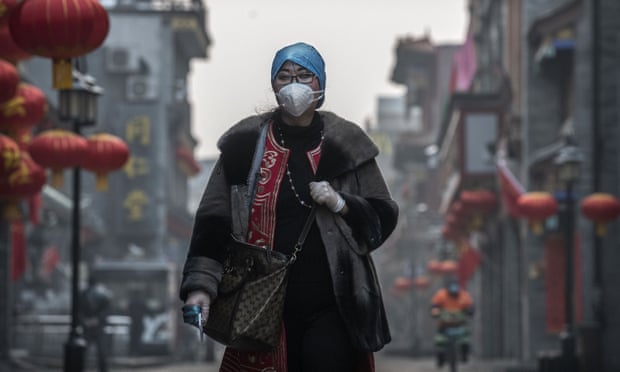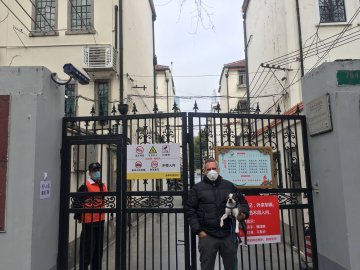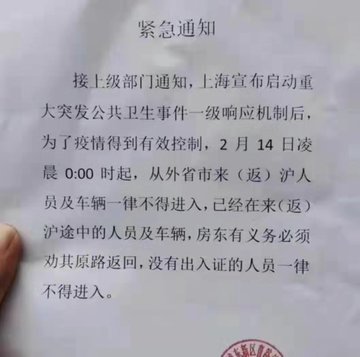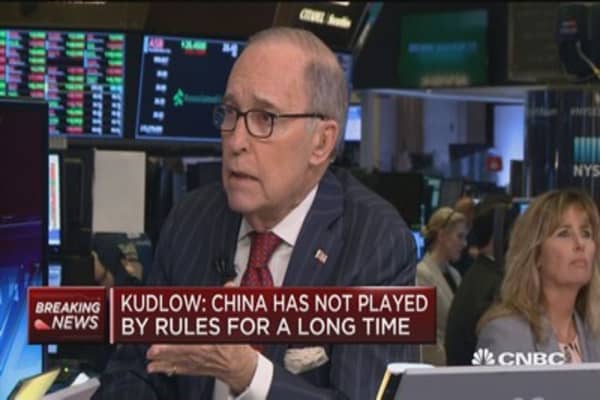By Lily Kuo and agencies

A senior White House official has called on Beijing to be more transparent over its handling of the Chinese coronavirus outbreak as Chinese authorities expanded “wartime” measures to limit its spread.
“We are a little disappointed that we haven’t been invited in and we’re a little disappointed in the lack of transparency coming from the Chinese,” said Larry Kudlow, the director of the US National Economic Council.
His comments came after Chinese authorities said they had altered how they count cases, resulting in confusion amid dramatic changes to the reported figures for two days in a row, and dampening hopes that the outbreak may peak later this month.
On Thursday, Hubei officials reported a large spike in cases after including those confirmed by CT scans, not just lab tests.
The revision added 254 deaths to the overall Chinese toll.
Then on Friday, China added 121 new deaths – but also removed 108 fatalities from the total, due to what China’s National Health Commission said were “duplicate statistics”.
In its latest update, the commission reported 121 new deaths and 5,090 new coronavirus cases, bringing the total number of people infected to more than 64,000 worldwide, with 63,851 of the cases in China.
The death toll stands at 1,383 – with three of those deaths outside of mainland China, one in Hong Kong, one in Japan and one in the Philippines.
The commission did not give further explanation of the double-counted cases on Friday.
“Based on the current trend in confirmed cases, this appears to be a clear indication that the fairly drastic measures Chinese have implemented to date would appear to have been too little, too late,” said Adam Kamradt-Scott, an infectious diseases expert at the Centre for International Security Studies at the University of Sydney.
Then on Friday, China added 121 new deaths – but also removed 108 fatalities from the total, due to what China’s National Health Commission said were “duplicate statistics”.
In its latest update, the commission reported 121 new deaths and 5,090 new coronavirus cases, bringing the total number of people infected to more than 64,000 worldwide, with 63,851 of the cases in China.
The death toll stands at 1,383 – with three of those deaths outside of mainland China, one in Hong Kong, one in Japan and one in the Philippines.
The commission did not give further explanation of the double-counted cases on Friday.
“Based on the current trend in confirmed cases, this appears to be a clear indication that the fairly drastic measures Chinese have implemented to date would appear to have been too little, too late,” said Adam Kamradt-Scott, an infectious diseases expert at the Centre for International Security Studies at the University of Sydney.
Chinese authorities also announced that 1,716 health workers had been infected as of 11 February. Six had died.
Officials on Friday, responding to questions about how those cases are counted, said that when asymptomatic patients show symptoms during quarantine they would be included as confirmed.
While public health experts have greeted the change in reporting – in order to capture more cases and get more patients needed treatment – positively, others say it raises more questions about the data. The change in diagnostic criteria has been applied only to Hubei province.
“Is the politburo really being honest with us?” Kudlow asked, referring to communist China’s top leadership body.
While public health experts have greeted the change in reporting – in order to capture more cases and get more patients needed treatment – positively, others say it raises more questions about the data. The change in diagnostic criteria has been applied only to Hubei province.
“Is the politburo really being honest with us?” Kudlow asked, referring to communist China’s top leadership body.
Kudlow said Xi Jinping had assured Donald Trump that Beijing would accept US help, but “they won’t let us”.
“I don’t know what their motives are. I do know that apparently more and more people are suffering over there,” he said.
At a meeting of senior leaders in Beijing on Thursday, officials called for other areas to “adopt quarantine and rescue measures equal to that of Wuhan”, which has been under lockdown for the past three weeks.
“I don’t know what their motives are. I do know that apparently more and more people are suffering over there,” he said.
At a meeting of senior leaders in Beijing on Thursday, officials called for other areas to “adopt quarantine and rescue measures equal to that of Wuhan”, which has been under lockdown for the past three weeks.
The meeting, chaired by the Chinese premier, Li Keqiang, called on Wuhan to speed up classifying and quarantining residents suspected or confirmed of contracting the virus.
In Huanggang, one of the worst-hit areas outside of Wuhan with more than 2,000 cases and at least 59 deaths, authorities issued an emergency measures for 14 days, “fully sealing” all residential areas and banning vehicles, except for those for emergency, medical or official purposes.
Checkpoints would be set up and public security deployed to enforce the measures.
In Huanggang, one of the worst-hit areas outside of Wuhan with more than 2,000 cases and at least 59 deaths, authorities issued an emergency measures for 14 days, “fully sealing” all residential areas and banning vehicles, except for those for emergency, medical or official purposes.
Checkpoints would be set up and public security deployed to enforce the measures.
Local district committees are to organise residents’ food and supplies.
“All residents must not enter or leave their communities without authorisation,” the notice said.
In Dawu county in central Hubei, home to more than 600,000 people, officials also issued an emergency notice on Thursday afternoon that residential areas and buildings would be sealed and vehicles banned.
Those who violate the rules “will be detained, according to wartime regulations”.
“In extraordinary times, extraordinary actions are needed,” the notice said.
In Zhangwan district in Shiyan city, authorities placed similar restrictions and said public security would help enforce the measures.
In Zhangwan district in Shiyan city, authorities placed similar restrictions and said public security would help enforce the measures.
Gucheng county and Yunmeng county also implemented the same measures for a period of 14 days.
On Friday, China’s ministry of finance said the country was earmarking 80.5bn yuan (£8.5bn) for fighting the epidemic.
On Friday, China’s ministry of finance said the country was earmarking 80.5bn yuan (£8.5bn) for fighting the epidemic.
So far, about half of that has been spent.
Researchers at China National Biotech, a state-owned company, said that human antibodies from survivors had helped patients who were critically ill, prompting calls for recovered patients to donate blood plasma.

Michael Smith
✔@MikeSmithAFR
I have been put under Home quarantine for 14 days after returning to Shanghai. For my neighbours, only 1 person per household is allowed out once a day. Some renters are being denied access to their homes. This is a city increasingly in lockdown. #coronavirus

566
5:35 AM - Feb 14, 2020
The next few weeks are critical for judging whether quarantine measures have worked, and as residents return to work in major cities.
Researchers at China National Biotech, a state-owned company, said that human antibodies from survivors had helped patients who were critically ill, prompting calls for recovered patients to donate blood plasma.

Michael Smith
✔@MikeSmithAFR
I have been put under Home quarantine for 14 days after returning to Shanghai. For my neighbours, only 1 person per household is allowed out once a day. Some renters are being denied access to their homes. This is a city increasingly in lockdown. #coronavirus


566
5:35 AM - Feb 14, 2020
The next few weeks are critical for judging whether quarantine measures have worked, and as residents return to work in major cities.
Officials said this year would not see a “peak” in return journeys after the lunar new year holiday and that all parts of the country should “continue protection and control measures”.
Containing the coronavirus in Wuhan, where the virus emerged in December, is still of “utmost importance” in order to achieve “economic and societal development” this year, officials said.
Outside China, one person died in Japan from the virus on Thursday night.
Containing the coronavirus in Wuhan, where the virus emerged in December, is still of “utmost importance” in order to achieve “economic and societal development” this year, officials said.
Outside China, one person died in Japan from the virus on Thursday night.
Japan’s health ministry said a woman in her 80s living in Kanagawa prefecture, west of Tokyo, had died.
She had been transferred between hospitals as her condition worsened and she was confirmed to have had the coronavirus after her death.
Her death was the third fatality from the virus outside mainland China.
Meanwhile, the US state department expressed deep concern about North Korea’s vulnerability to the outbreak.
Her death was the third fatality from the virus outside mainland China.
Meanwhile, the US state department expressed deep concern about North Korea’s vulnerability to the outbreak.
The statement comes as Pyongyang scrambles to strengthen quarantine and preventive measures.
North Korea has yet to report a case of the virus, but state media reports have hinted that an uncertain number of people have been quarantined after showing symptoms.
North Korea has yet to report a case of the virus, but state media reports have hinted that an uncertain number of people have been quarantined after showing symptoms.
Experts say an epidemic in North Korea could be dire because of its chronic lack of medical supplies and poor healthcare infrastructure.
Passengers on a cruise ship that spent two weeks at sea after being turned away by five countries over coronavirus fears started disembarking in Cambodia on Friday.
The MS Westerdam, carrying 1,455 passengers and 802 crew, docked in the Cambodian port town of Sihanoukville on Thursday.
Passengers on a cruise ship that spent two weeks at sea after being turned away by five countries over coronavirus fears started disembarking in Cambodia on Friday.
The MS Westerdam, carrying 1,455 passengers and 802 crew, docked in the Cambodian port town of Sihanoukville on Thursday.



